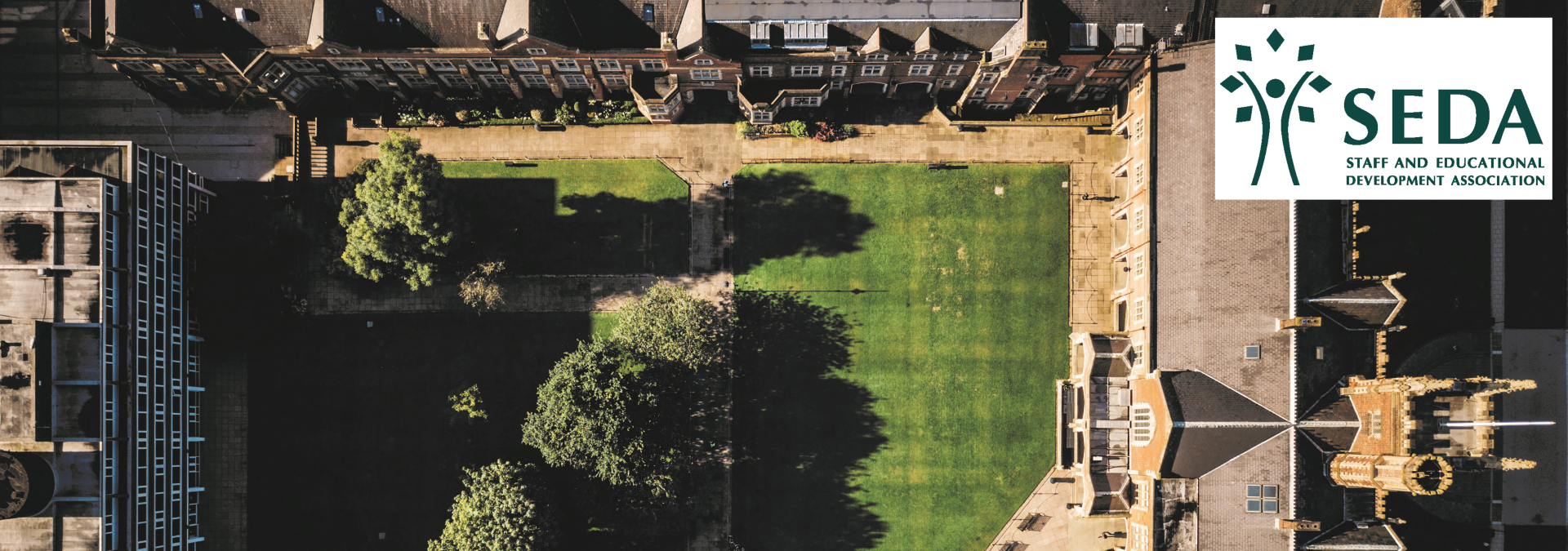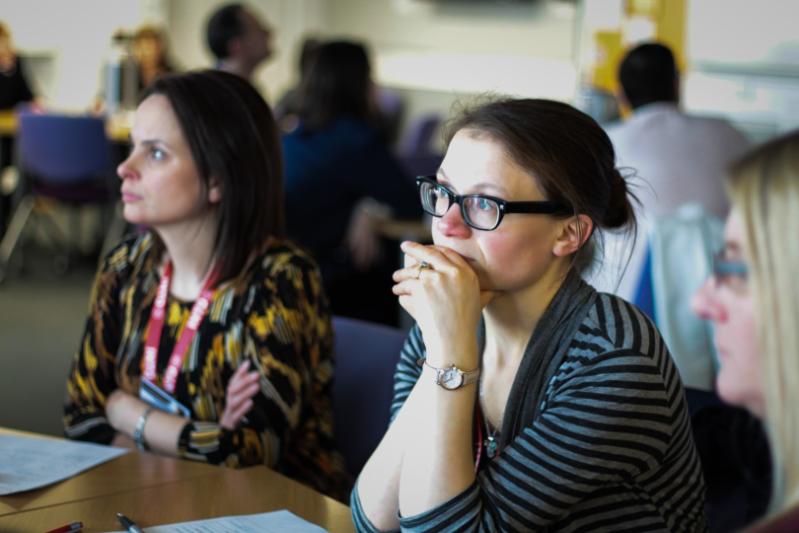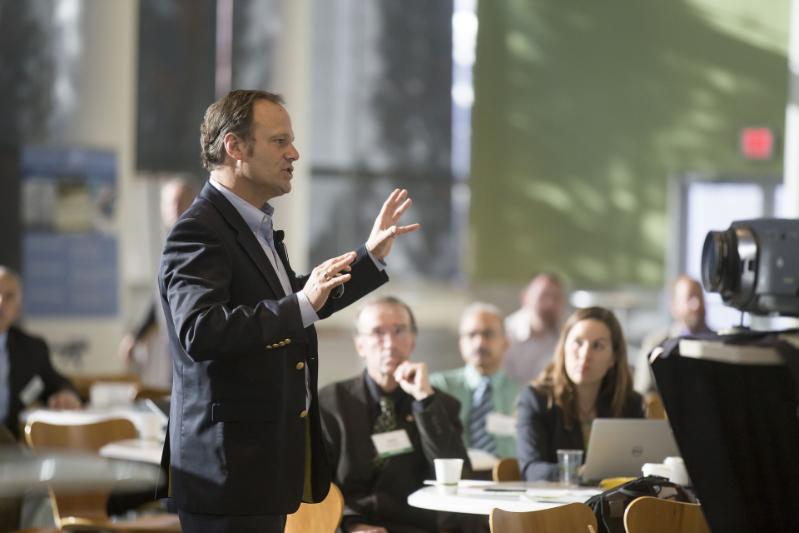
The programmes are designed to support staff and provide a source of continuous professional development. Each programme runs for a number of weeks and is delivered via Canvas and MS Teams. All SEDA programmes are externally accredited by SEDA, The Staff & Educational Development Association. The QUB SEDA programmes are a part of Queen's Merit Award scheme.


The Leading Education for Sustainable Development (ESD) in the Curriculum is a programme of study designed to bring together staff in an environment which encourages reflection on their past and current teaching and assessment practices, to enhance their skills as educators in an ESD-informed manner. By the end of the programme, participants should be able to recognise and embed the hallmarks of ESD in their educational practice and how it can enhance the student experience.
The programme is open to Module Co-ordinators or Programme Directors, or members of staff who have significant influence over the curriculum development and design of credit-bearing courses. Embedded in the material and signposted, we will be learning design principles and Sustainable Development Goals and the programme aligns with the Queen’s 2030 Strategy.
This programme will run from September to December, offering six in-person workshops, held on a fortnightly basis. As part of the assessment process, participants must complete reflective activities, a module critique and redesign.
Session dates:
Session 1: 25/09/24
Session 2: 09/10/24
Session 3: 23/10/24
Session 4: 06/11/24
Session 5: 20/11/24
Session 6: 04/12/24
Times are subject to change.
There are four assignments due over the six-session leading to SEDA accreditation. For more details contact Karen at k.fraser@qub.ac.uk

The Developing Leadership in Educational Practice is a programme of study designed to bring together staff who work within the same environment to share good practice and discuss issues to enhance their personal development and wider professional practice. It is intended that you will transfer new-found knowledge to adapt or change the way you work to improve the student experience. This award recognises the importance of Academic and Professional Services Leaders who have a pivotal role at QUB. You may join this programme whether you are from a professional service or academic role. Those in leadership roles in the Students’ Union would also be eligible for this programme.
This programme will run over 22 weeks with a mix of Teams meetings and online activities that will contribute to the continuous assessment. There will also be a series of lunchtime forum discussion sessions that will help build a learning community.
Participants will:
- Identify their own professional development goals, directions or priorities;
- Plan for their initial and/or continuing professional development;
- Undertake appropriate development activities;
- Review their development and their practice, and the relations between them.
Programme lead: Dr Claire Dewhirst (CED)
The next programme's start date is February 2023 - Expressions of interest and queries

A blended learning course for new, aspiring and experienced Programme Leaders.
Programme aims:
- To support you in your professional development as an educational leader;
- To support and recognise your individual progress, practice & professional achievement;
- To enhance curriculum development and, hence, the student learning experience;
- To promote the development of professionals with the knowledge, skills and attributes to effectively lead, nurture and guide educational change and development in the sector.
Programme lead: Karen Fraser (CED)
This is a 19-week programme with two Team Meeting sessions, weekly online activities, weekly support and portfolio submission.
This activity can contribute to one of the case studies should you wish to apply for SFHEA (Senior Fellowship of the Higher Education Academy via QMA).
The next programme will begin in October 2021 - expressions of interest and queries

The award in Mentoring is a SEDA recognised award open to members of staff engaged in mentoring for Queen’s Merit Award (QMA) Advance HE Fellowship scheme (D1, D2 and D3). Applicants must be Fellows or Senior Fellows of the HEA. The programme introduces mentoring theory and models as well as training and support for participants in developing their online mentoring skills. It is a CPD opportunity for staff, providing professional learning over a structured programme in mentoring for teaching and learning enhancement activity.
The programme is delivered online initially, with two online workshops and 22 weeks of online activities with online support for work-based learning for trainee mentors. Assessment of the programme is against SEDA Values and Outcomes.
- You need to be able to commit time to complete the programme over two semesters;
- You should identify a mentee or be happy to have one allocated to you for the duration of the programme;
- In the first instance appointed mentees will come from a pool of QMA potential applicants, PGCHET students, and potential internal and external Teaching Awards applicants.
Programme lead: Karen Fraser (CED)
The next programme will begin in TBC – expressions of interest and queries

The Supporting Learning in a Digital Age (SLDA) programme will run over 12 weeks and delivery will be supported online through Canvas. Participants will engage in face-to-face workshops and will complete a range of online self-paced activities that build on each other and provide evidence for the final assessment. Participants will engage in on-going discussion forums that will help build a learning community.
All of the programme learning activities provide an opportunity for participants to demonstrate how assessment requirements are met, and will be used to build up evidence for the final claim. It is crucial that you demonstrate your commitment to the SEDA values. At the end of the programme, you will submit a claim in which you must evidence how you have met the Core Outcomes and Specialist Outcomes of the SLDA SEDA programme.
The aims and outcomes of the programme are:
- To support individuals in the effective use of educational technologies, including technology-enabled approaches or interventions in supporting and/or enhancing learning;
- To recognise these professional achievements;
- To advance professional practice by promoting scholarship in the use of educational technologies, including evaluation, professional reflection, and reporting;
- To enhance student learning, particularly by enabling greater autonomy, creativity, flexibility and widening opportunities;
- To encourage the development of learning communities sharing the SEDA professional values;
- To facilitate the sharing of effective practice within and across institutions.
Programme leads: Dr Vilinda Ross (CED)
The next programme will begin in August 2023 - expressions of interest and queries

A blended learning course for new, aspiring and experienced University Coordinators.
When approval to proceed has been granted for a collaborative arrangement, the relevant School is requested to nominate a University Coordinator to provide a point of contact on the development, monitoring and enhancement of the collaborative arrangement at programme level.
The University Coordinator role is one of the key elements in maintaining standards and ensuring ongoing dialogue with the collaborative organisation.
This is a 19-week programme with two Team Meeting sessions, weekly online activities, weekly support and portfolio submission.
This activity can contribute to one of the case studies should you wish to apply for SFHEA (Senior Fellowship of the Higher Education Academy via QMA).
Programme Lead: Karen Fraser (CED)
The next programme will begin in October 2021 – expressions of interest and queries